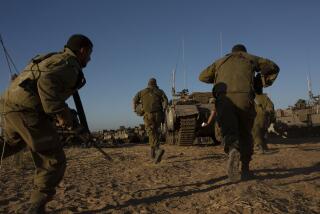After ‘Desert Storm,’ Barely a Footprint Was Left in the Sand
Iraqi forces invaded Kuwait early in the morning on Aug. 2, 1990. This unprovoked and blatant act of aggression prompted that very rarest of phenomena: an international consensus. Almost without exception, every government publicly denounced Iraqi dictator Saddam Hussein’s invasion and called for his troops to leave immediately. Prodded by Prime Minister Margaret Thatcher of Britain (“Don’t be wobbly now, George”), President Bush took advantage of this agreement to stitch together an expeditionary force made up of 29 states.
Nearly everyone at the time agreed that the Gulf War was a huge event, perhaps an epochal turning point. Bush spoke about it leading to the start of a “new world order” in which coalitions would come together to prevent Iraqi-style use of force. Pundits expected that the war assured Bush four more years of the presidency just as it meant that Hussein would soon be gone, perhaps followed by the breakup of Iraq. Analysts predicted that a new, American-oriented era had begun in the Middle East, with more democracy, human rights and economic competitiveness. Many agreed with Henry Kissinger that victory over Iraq offered “a historic opportunity” to deal with the Arab-Israeli conflict.
In retrospect, one can only marvel at how little of this came about. Subsequent efforts to impose a new-world-order style solution on crises failed in places like Somalia and Bosnia.
Hussein made a unique string of mistakes, and his futile conventional war appears to have ended an era, not started one. Other than Turkey and Israel, the Middle East continues to boast fewer real elections, fewer human rights and fewer industrial exports than almost any other region.
The Arab-Israeli conflict did change after the war, especially with the Madrid Conference of October 1991 and the Oslo process of two years later, with its seven agreements between the Palestinians and Israel in as many years. But it would be hard to characterize these as making any real progress toward resolving the conflict.
While Israel has shown itself hugely flexible, giving up on one traditional position after another (especially concerning the Golan Heights and Jerusalem), the Syrians and Palestinians have basically stuck with the old outlook, showing themselves yet unwilling to accept the Zionist state. Nearly all signals betray a continuing intent to destroy Israel. This hardly counts as peacemaking.
And Iraq? The regime is far weaker and the central government no longer controls the whole country, but in its essentials--with Hussein still in power and the borders unchanged--it remains preposterously unchanged.
Looking over the past decade finds just one major consequence of the war, and it is an ironic one. Fearing a repeat of the Iraqi invasion, the other Arabic-speaking states of the Persian Gulf have nestled closer to the United States, permitting troops to be stationed on their territory, as well as many other intimate military acts.
While this new relationship has benefited both sides, it has also spurred an intense growth in anti-Americanism. Osama bin Laden epitomizes this phenomenon. A U.S. comrade-in-arms in Afghanistan against the Soviets during the 1980s, today he stands accused of sponsoring a global terrorist operation that aims to kill Americans.
In all, when one recalls how important the war was thought to be, it is astonishing to observe how minor its legacy now appears. The code name given to the war against Iraq was Operation Desert Storm. As Gulf expert Patrick Clawson notes, it is symbolically fitting. A desert storm blinds and can suffocate but, once it passes, the desert is there as ever, hardly changed. So it was with the crisis that began 10 years ago. It felt hugely important, and it would have been had Hussein prevailed. But once we survived it, the whole episode left most everything in its old place, hardly changed.
More to Read
Sign up for Essential California
The most important California stories and recommendations in your inbox every morning.
You may occasionally receive promotional content from the Los Angeles Times.










